|
|
You’re here, so you’re probably interested in a role as a remote WordPress developer 😉 With prospects ranging from handsome pay to siteless work, it’s no mystery these jobs are so desirable. But what does it really take to get hired and make a living out of WordPress development (and do it well)?
Quite a lot, it seems.
For help, I brought Freemius founder and CEO Vova Feldman, CTO Dror Yaakov, and VP of Engineering Swashata Ghosh on board to offer guidance and tips on how to get hired as a WordPress developer in 2023. We explore:
- The different development roles in WordPress
- Making your application stand out from the crowd
- Equipping yourself with desirable professional skills
- Showcasing the attitude and soft skills employers are looking for
- Communicating you’re a pro by investing in the right office setup
Let’s get into it!
What’s Your Jam? Profiling Development Roles in WordPress
WordPress developers are (mostly self-confessed 😉) rock stars playing different instruments in the same band. Let me explain.
Just like singers, percussionists, and guitarists fulfill individual musical roles, so too do different WP developers hum, drum, and strum in union to create our ecosystem’s symphony.
Before exploring the skills and competencies that will help you get hired as a remote WordPress developer, take some time to familiarize yourself with the different roles in our space. Which one resonates with your abilities and interests? Identify that and you’re fit to plot your route to employment.
(If you’re familiar with WordPress developer divisions, feel free to skip ahead and learn about writing persuasive cover letters.)
(Most) WordPress Developers Aren’t Engineers
Let’s clarify an important — yet controversial — subject.
Software engineers tend to avoid WordPress because of its backward-compatible nature and the use of outdated coding practices. This article explains why WordPress has a less-than-stellar reputation among engineers.
The majority of WordPress developers are self-taught and don’t have a computer science or software engineering degree. It’s part of the democratic, open-source nature of the space: If you’re willing and able, you can contribute to the WordPress Project and build your own products.
This is not to say that the platform is entirely devoid of engineers. You’ll find that most WP developers with software engineering/computer science degrees will usually hold C-level positions like CTO or VP of Engineering, meaning there’s still opportunity for WordPress developers to learn from experienced, educated engineers and upskill.
Moving on to less provocative matters 😁 Let’s help you find the WP role that resonates with you, starting with:
(Traditional) WordPress Developers
It’s strange that the industry has settled on ‘WordPress developers’ to describe this role, since it differs entirely from what core and plugin devs do (more on core and plugin development soon). Traditional WordPress developers (mostly) implement WordPress instead of developing the platform or creating plugins and themes.
Vova explains:
These WordPress developers can install and configure WordPress plugins and themes. They usually have some basic HTML, CSS, and JS knowledge, and can even customize and troubleshoot WordPress using the Admin dashboard. Traditional WordPress developers can also make small code-level tweaks in the form of snippets, either through the functions.php theme file or by using plugins like Code Snippets Pro. However, their tasks don’t typically revolve around the coding realm.
A traditional WordPress developer’s job is to handle WordPress websites. They do this by installing and keeping WP core and plugins up to date, troubleshooting compatibility issues, making visual tweaks, managing user roles, and so forth.
In addition, implementers who have good user-facing and communication skills often end up in support jobs. “This is because technical support is usually the way to go for WordPress developers who don’t possess advanced coding knowledge and capabilities,” Vova clarifies.
Disclaimer: Since the term ‘WordPress developer’ is overused, the above information is a generalization of what we have observed from the market. There are, of course, many talented and exceptional WordPress developers out there!
WordPress Theme Developers
WordPress theme developers work on the front-end, which is the user-facing side of the platform. Or, in simpler terms, what regular peeps see when they visit a website.
Devs in WordPress theme development don’t usually have experience in computer science and often come from design backgrounds. This isn’t to say they can’t code, but their expertise doesn’t lie in the technical domain. They’re usually unfamiliar with MySQL databases, code design patterns, object-oriented programming, and algorithms and data structures.
WordPress theme development allows creatives with expertise in digital programs — like Adobe — to combine their visual skills with web creation. They usually end up:
- Building commercial themes for theme shops
- Designing custom themes for clients, either as agency employees or freelancers
It depends on the role, but WordPress theme developers will usually create child themes instead of building them from scratch. To clarify: Most agencies offer a go-to starter theme, and will hire a theme developer to customize it according to individual clients’ needs.
“It might sound like a cushy job, but I’d advise you to approach with caution,” Vova warns. With the mounting momentum of static software, WordPress is rapidly shifting to WYSIWYG builders and page builders that expedite web creation. Ironically, this means traditional designers could soon be replacing theme developers. To find out how visual creators can bank on this development (pun intended), check out this article I wrote about building and selling Elementor Template Kits.
On the flipside of theme development, there’s core.
WordPress Core Developers
WordPress core developers work on the back-end and are constantly striving to fix and improve the software. Although these WordPress developers don’t build products like themes or plugins, they get to make an impact on 40%+ of the entire web.
Core developers are primarily tasked with contributing to WordPress. Ergo, they usually work for companies that are heavily invested in the WordPress ecosystem. Corporations like Automattic, Yoast, and Humanmade sponsor core contributors as full-time employees to fulfill their Five for the Future obligation. Check out this article about contributing to the WordPress Project to find out more.
What does contributing look like for these devs?
In sum, they work with legacy code to fix bugs and ensure compatibility. Because the WordPress project is more than 20 years old, the software requires constant maintenance and improvement to keep up with new infrastructure.
In this regard, WordPress core developers are metaphorical mechanics of WordPress. There is, of course, a chance that they could advance the software by developing groundbreaking new features, but the likelihood is slim — in the core world, improvement generally equals upkeep.
WordPress core developers need to be self-motivated and comfortable working in an open-source, volunteer-driven environment. They must be well-acquainted with WordPress’s code base, and understand the functionalities and inner workings of the WP engine. Their job also demands solid understanding and knowledge of PHP. As per Josh Pollock:
WordPress uses four languages: HTML, CSS, JavaScript, and PHP. The first three are executed in the browser, while PHP works on a web server to generate and serve the HTML, CSS, and JavaScript the browser uses.
Additionally, if a WordPress core developer’s primary focus is contributing to the Gutenberg project, they will also need to be proficient in ReactJS.
Finally, we get to the top-dog position in the WordPress developer pack:
WordPress Plugin Developers
“WordPress plugin developers are highly sought-after by product companies,” Vova says. “If you want to maximize your chances of getting hired as a remote WordPress developer, this role is the one you should aim for. Plugin development is considered the holy grail of developing for WordPress, since it’s what ultimately drives the software forward.”
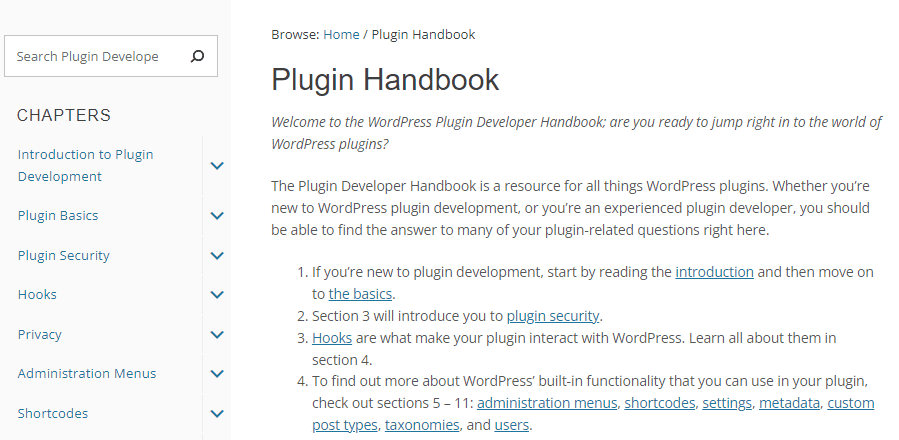
To illustrate: Did you know Gutenberg — the block-based editor that’s revolutionizing the platform — was a separate plugin before it was rolled into WordPress core?
I could wax lyrical about plugin development — actually, Freemius has done so already in our WordPress Plugin Business Book — but, as a general rule, WordPress plugin developers should:
- Understand the functions of WordPress, with an in-depth understanding of actions and filters.
- Be able to extend and modify WordPress in any way, in a structured manner.
If you’d like to learn about developing a successful plugin, this article by Codeable provides a thorough yet concise rundown. And to find out more about how plugins work, check out this article by HubSpot. But ultimately, the WordPress Plugin Developer Handbook is the go-to blueprint for understanding how to make the magic sauce that extends and modifies WordPress in new ways.
We’ve covered the different types of WP developers, so now it’s time to move onto the good stuff: the knowledge, skills, and tools that will help you land a job.
First Impressions: The Importance of a Good ‘Cover Letter’
I added quotation marks because I’m not referring to a traditional cover letter 😅 Instead, I’d like to show you how to write an email or message that will grab a potential employer or recruiter’s attention. Vova insists:
Relying on a CV as your main showcase won’t cut it. Essentially, it’s a cold document that lists your experience and qualifications; not your attitude or interpersonal skills.
WordPress founders/employers have busy schedules and will be hard-pressed to examine your CV with nothing else to go on. They first need some indication that you’re a good fit for their team. Likewise, recruitment agents get contacted by dozens of candidates that match your experience. You need to convince recruiters to ‘sell’ you to a potential employer.
Here’s how to construct a cover letter that stands out:
Write an attention-grabbing paragraph of no more than five or six sentences that tells a potential employer/recruiter something about you. Show them why viewing your CV and setting up an interview is worth their time. I know — writing isn’t everyone’s forté. But researching WordPress development companies before applying and suggesting how you can add value is bound to make an impression.

I’ve drafted a very generic example for you to riff off (no need to thank me).
Hi <name>,
I recently came across your job offer for [WordPress developer job description].
I’m a WordPress/Theme/Core/Plugin developer with N years of experience living in [city/town/area]. I’m also qualified / have training in X. Because of my experience in X and the journey I had to go through in order to make a success of X, I am aware of the unique challenges your company is solving. I believe I could provide value in X for the position you’ve advertised by applying my expertise in X.
OR (in the case of a recruitment agent):
I’m a WordPress/Theme/Core/Plugin developer with N years of experience in X / a qualification in X / training in X. Because of my expertise in X and unique firsthand experience/involvement with X, I’m aware of the challenges [company name] faces to overcome [a problem] and am passionate about [the problem the company is solving]. I believe I’d be a good fit for the role at [company name] because I can provide a solution for/add value in the area of X.
I’ve attached my CV and hope to hear from you soon.
Kind regards,
The most important part of this message? Don’t overthink it, and keep it brief. If you’re really struggling, it’s worth paying a professional copywriter to create a template for you.
What Are Employers Looking for in a WP Developer’s CV?
A good cover letter gives you an ‘in’ and a great CV cements your potential. While you should include additional experience or skills — like an internship or freelance coding work — the following three factors will make a potential employer take note.
1. Degrees and Qualifications
Being qualified in software engineering or computer science is a mega-bonus. If you have the time and financial means to complete either degree, it will:
- Serve as a safety net for securing employment.
- Expand your knowledge and skill set, which is especially useful when applying for senior or specialized positions.
But as I mentioned earlier — and please pardon the contradiction — most WordPress developers usually don’t have either of these degrees. “Being self-taught via online courses and documentation is generally acceptable,” Vova says.
And the best way to acquaint yourself with the WP ecosystem is by learning the vernacular.
2. A Knowledge of WordPress Coding Languages
WordPress is made up of four coding languages:
W3Schools is a great platform for both novice and professional remote WordPress developers to learn and receive certification in most major coding languages.
“While traditional WordPress/theme developers aren’t required to be ultra-proficient, coding languages are the foundation upon which core and plugin development is built,” Vova insists.
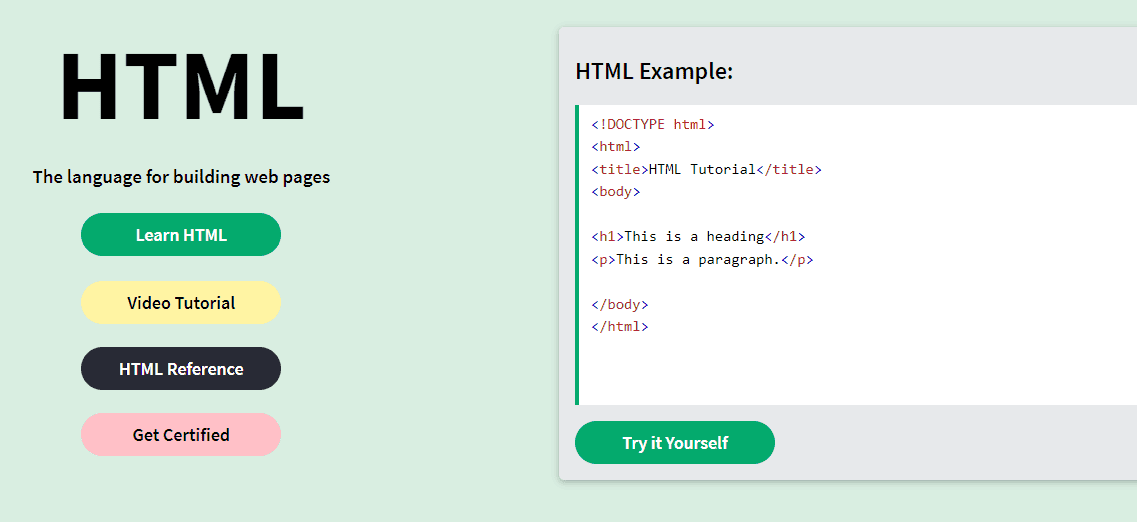
3. You’ve Listed a Plugin or Theme on WordPress.org or Contributed to Core
To a potential employer, this is the equivalent of auditioning for their band (i.e. you can play an instrument).
“It proves you’re familiar with the WordPress ecosystem,” Vova clarifies. “Most employers aren’t looking to train you from scratch, but they’re almost always eager to help you grow and expand your skill set.”
Additionally, your listing helps them identify innovation. Your plugin/theme or core contribution is a reflection of how good you are at creating a solution for a problem.
And because WordPress is open source, potential employers can open and directly examine your code for conventions and best practices. Vova urges:
Be prepared for this! You should regularly revise your code with updated conventions and add comments. If an employer sees an outdated plugin that’s using conventions from 2015, they’ll move on to another candidate.
Now that you have the three fundamental ingredients for a stellar CV, let’s look at the special add-ons that will elevate it to five-star status.
Skills, Knowledge, and Attributes That Tick the Top Boxes
As it turns out, knowing coding languages alone isn’t enough to get hired…
Whether you’re applying at a startup or a corporate, most employers want a teammate more than an employee. The following skills and attributes should be in your wheelhouse to prove that you can be an asset to the business.
Overcoming Challenges and Solving Puzzles Is What You Call ‘Fun’
Let’s throw a healthy mix of curiosity and creativity into the mix too.
The fundamentals of software development don’t vary much. Each coding language does, however, have different techniques to master and new practices to conquer. This is why curiosity is so important: It will motivate you to keep learning, to ask questions, and to be open-minded when another WordPress developer suggests a different approach to solving a problem.
And creativity?
“I’m not saying that you have to be artistic,” Vova jokes. “Instead, I mean that to be a successful WordPress developer, you have to love challenges because you will constantly be solving problems. Creatively solving problems means finding simplified solutions that save time.”
Your English Is Good
Vova reckons that the better English speaker you are, the better WordPress developer you’ll be.
Once you start writing code, a wide vocabulary will help you pare down your words when naming variables/classes/functions, making your code more digestible and easy to understand.
Most free coding courses are also offered in English, and a lot of free documentation (in English 🤓) is available on the internet.
But there’s another boon: distributed WordPress companies favor devs who understand English because it’s the lingua franca of the ecosystem (and the business world). Additionally, many US or European organizations are prone to hiring remote WordPress developers from developing countries because it helps them cut down on salaries.
“If your country has a low cost of living and you’re earning — say — $80K annually, you can live like royalty,” Vova says.
In addition to being proficient in English, remote WordPress developers should also be good at getting along with others.

Your Communication Is On Par With Your Coding Skills
Maybe not exactly on par… but you get the point 😉
As a remote WordPress developer, chances are you’ll be working with teammates from different countries and most of your communications will be textual. It’s easy for miscommunication to slow things down, impact teamwork and efficiency, produce incorrect deliverables due to misunderstandings, and lead to frustration. This means you need to be clear, concise, and direct in your messaging to ensure that other team members understand what you’re suggesting or requesting.
As a remote worker myself, I can testify to the importance of interacting and building relationships with colleagues that I only recently met in person at WordCamp Asia 2023. Effective teamwork can only take place if you reply timeously, clearly, and — importantly — with respect.
You’re a Fast, Autonomous Learner Who Knows How to Use Search Engines
In 99.99% of cases, anything you want to develop has already been created and documented somewhere. Every time you run into a challenge, you’re going to refer back to the internet to find out if other WordPress developers have figured out how to address it.
Knowing how to use keywords and clever hacks will help you find what you’re looking for with search engines like Google or YouTube. For instance, when you wrap a keyword or phrase with quotes, it means that exact string will appear in all search results (super simple, sure, but this easy hack is something that will pay dividends if you’re looking for accuracy).
And speaking of online tools…
You’re Good With AI/ChatGPT
There’s no denying that artificial intelligence is driving waves of drastic change in cyberspace. Debates, speculation, and predictions aside, AI — ChatGPT, specifically — can work to your advantage by expediting mundane tasks:
- Check out this video where Jamie Marsland from Pootlepress shows how he built three plugins in ten minutes using ChatGPT. When used correctly, ChatGPT can lay much of the groundwork for plugin/theme creation for you.
- ChatGPT can also speed up communication by drafting emails and Slack messages.
Vova predicts:
I believe AI is going to change the way remote WordPress developers work. In WordPress’s current state, the code has already been documented. It’s been explained in articles and chronicled on forums. This makes the supporting documentation ripe and ready for AI automation.
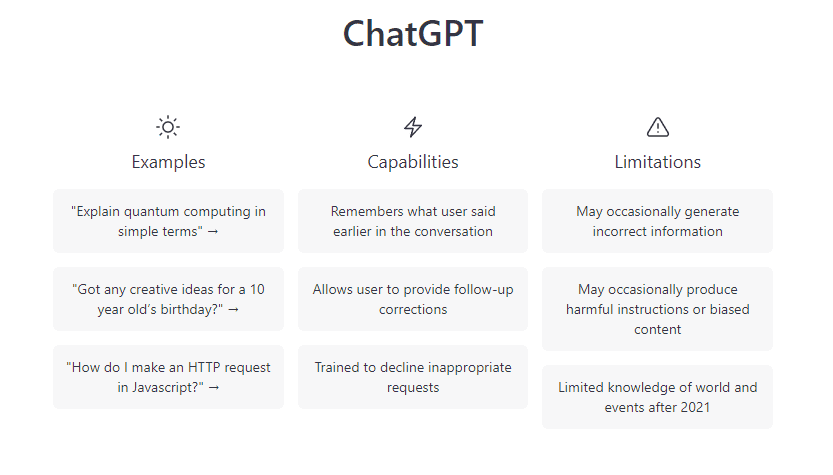
And while we’re on the topic, AI (probably) won’t be coming for skilled, knowledgeable, and problem-solving WordPress developers’ jobs [just yet 😅]. However, it does pose an imminent threat to another breed of WordPress devs.
Beware: No Country for Code Monkeys
Remember when I said good WordPress developers should enjoy using code to solve problems? Above all else, this aptitude will help you secure — and hold down — a WP development job.
“When I work with Freemius’s WordPress developers, we’re usually trying to achieve something from a business perspective,” Vova says. I’ll go to them and say, ‘We have this problem and I need you to figure out a solution for it’. Because they’re passionate and knowledgeable about WordPress development, they can design a solution that suits our unique requirements without any guidance from me. As a founder and entrepreneur, it’s amazing to work with these kinds of teammates.”
But according to Vova, there’s another type of WordPress developer that sits on the opposite end of the problem-solving spectrum. They’re called “code monkeys”.
If you’re a code monkey, your love of paychecks probably outweighs your love for coding. These types of WordPress developers prefer to be told what to do, whereas dedicated WordPress developers love coming up with creative solutions to challenging problems.
Nevertheless, rookie WordPress developers will inevitably be code monkeys because they’ll need to learn a company’s practices and processes as a start. This is actually a good thing. It helps inexperienced WordPress devs get comfortable with software and learn from their mistakes.
However, this learning curve should only be used as a means to an end if you’re serious about your future in WordPress development. And this is not just because ambitious WP devs will want to progress to senior positions…
Code monkeys may very well go extinct in the near future.
“At this point it’s still speculation, but I have a strong feeling that AI is going to impact the sustainability of code monkey jobs by effectively replacing them,” Vova says.

But even so, leaving most of the coding legwork to AI is not an option if you’re looking to get hired as a skilled WordPress plugin or core developer. Setting yourself apart from the competition means knuckling down and getting well-acquainted with the software.
Coding Credentials for WordPress Core and Plugin Developers
In the same way a high score in Guitar Hero doesn’t make you the next Jimi Hendrix, failing to master WordPress’s coding riffs and chords will impact getting a (lead) break with a WP company. Tick off the following coding capabilities and you’re well on your way to land a banger of a WP development gig.
You’ve Studied the Code WordPress was Built On
This will likely prove to be a frustrating endeavor.
“WordPress software has a bad reputation because of how the core project was built,” Vova says. “It doesn’t follow modern software practices, and many of the project’s initial volunteers didn’t have a computer science background.”
But even though WordPress’s legacy code is outdated and doesn’t follow modern software practices, you need to study (and understand) it. If you’re a core developer, it’s the foundation upon which you’ll construct improvements and updates. And for plugin developers, grasping concepts like functions and classes will help you use the software to extend WordPress.
You’ve Gone Through Code Reviews
Code reviews are critical to becoming a better developer. Vova says:
If I’m looking to hire someone, it’s a red flag if they haven’t gone through any code reviews because this is the most obvious way to see if they have learned from developers who are more senior.
A lack of coding feedback implies that you only follow your own practices. Not because you’re lazy or sloppy, but because they’re your only frame of reference. And even if you’re qualified with years of experience, lacking mentorship effectively renders you a junior developer.
If your code is not being reviewed at the moment, reach out to peers and ask them for favors. Although these code reviews will most likely be amateur, they will help you learn from others and gain new insights about development.
You Have Experience With Writing Tests
Adding to code reviews, writing your own tests is a vital exercise. Why? Because doing automated tests and writing integration tests will help you understand if individual parts of your software are working correctly. It’s the only way for the software to function as a whole.
While this is a bonus, it’s still a highly fetching feather in any remote WordPress developer’s cap. It signals that you’ve worked on large-scale projects with proper systems and practices in place. To a potential employer, this indicates that:
- You don’t need supervision or guidance to improve code because you can create tests to assist you.
- You can approach code from different angles.
- You know how to put code through its paces.
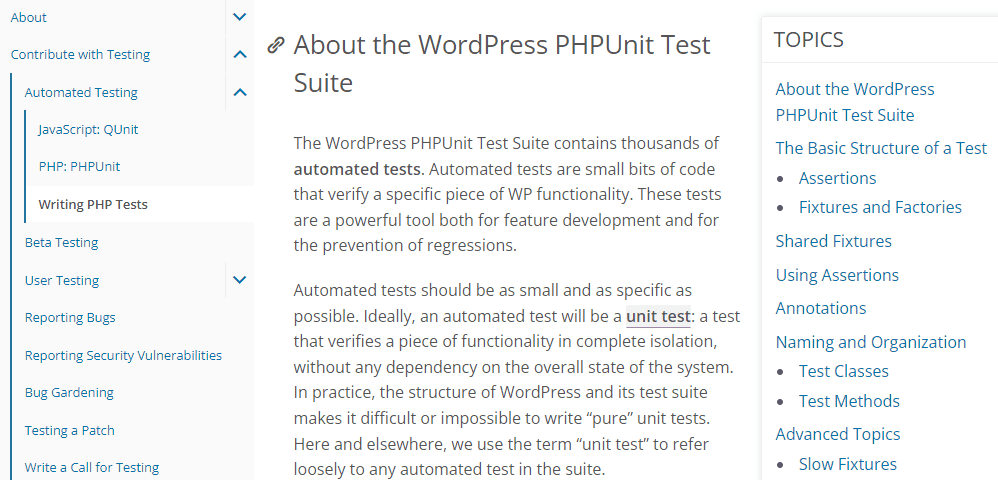
You Prioritize Design Patterns
According to Swas, the foundation of WordPress development is writing manageable codes that follow good design patterns.
Design patterns are essentially common patterns that help you solve different problems. Think of it as solving a mathematical equation — if you know and understand the formulas, the better the chances you’ll be able to address the problem at hand.
Dror sees design patterns as a way to set yourself apart from the competition when searching for a remote WordPress developer position.
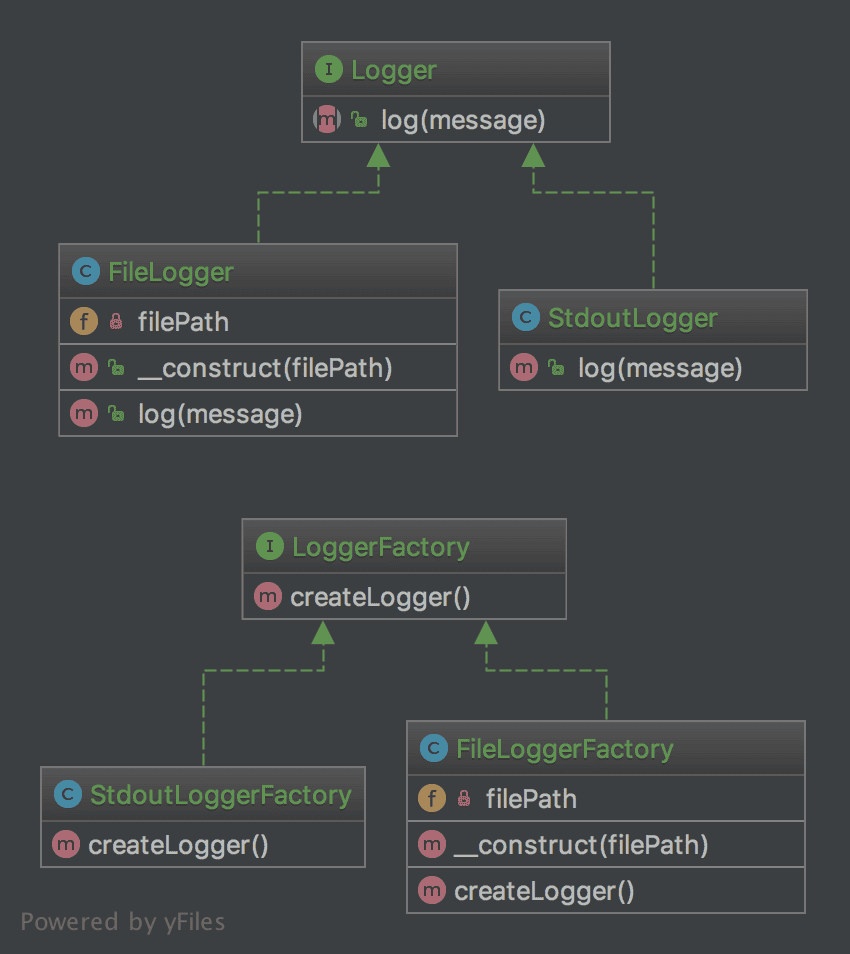
In practice, you’ll rarely need to use design patterns as a WordPress developer, but it will give you a major upper hand in the recruitment process. Swas comments:
Because the market is saturated with WordPress developers, the competition is high. If I’m examining a potential candidate’s experience, I want to know how long it took them to complete a project. If they aren’t using design patterns, they likely spent more time on the project than they should have.
Working fast is going to increase your odds of landing a coding job as a WordPress developer. However, it’s important to understand that design patterns aren’t shortcuts. Swas and Dror both believe that learning about shortcuts from other WordPress developers can be useful, but only if you know with certainty that using the shortcut in a given scenario is safe. Obviously, this will come with experience.
You Use a Debugger for Backend Development
“From Freemius’s experience, WordPress developers usually know how to use frontend debuggers like Google Chrome’s. However, most of them have never installed XDebug or done proper backend debugging,” Vova says. “Using XDebug will not only make you stand out — you’ll become 10x more efficient in backend development.”
You Understand that Software Products are Not About the Code
From a business perspective, code itself is not the product. Rather, it’s a means to an end (i.e. a software product) that solves a business problem.
“Good WordPress developers understand the importance of legacy code, because it lays a foundation to constantly improve software products,” Vova explains. “Improving existing code doesn’t mean rewriting it. Instead, it requires you to improve it incrementally.”
This is why working with other experienced WordPress developers is so important. They bring new coding practices to the fold, and ones that will often support product advancements, adjustments, or fixing bugs.
The coding skills and competencies we’ve discussed will show an employer that you mean business. And in the same vein, investing in quality tools — if you have the means — will improve your prospects even more.
Bonus for Remote WordPress Developers: Have a Professional Work Setup
When looking for a job as a remote WordPress developer, a solid home office setup shows professionalism and efficiency.
“If — for example — a remote WordPress developer only has a 13-inch laptop in their arsenal, it’s a red flag,” Vova says. “If you want to show you’re a pro, you need to use pro tools.”
In web development, using a MacBook is an advantage over working on a PC. And as a professional remote WordPress developer, you’re generally expected to work with at least two displays: one for the editor or IDE (Integrated Development Environment), and another one for the browser.
“A good setup is a bonus,” Vova re-emphasizes.
Lacking one doesn’t mean you won’t get hired, but you’re going to forfeit serious bonus points. Keep in mind that unless you’re applying with a company in your region, the employer probably won’t send you a brand new MacBook Pro before you’ve completed your trial period. And proper tools are essential for producing quality work during this critical time.
Vova suggests the following setup for remote WordPress developers:
- MacBook Pro
- At least one additional external display (20’’+)
- IDE with a Linter and XDebug (PhpStorm or equivalent). If you use an editor and not an IDE, you need to have a good reason why
- An external keyboard and mouse/trackpad
- A solid webcam, headset, and mic for communications
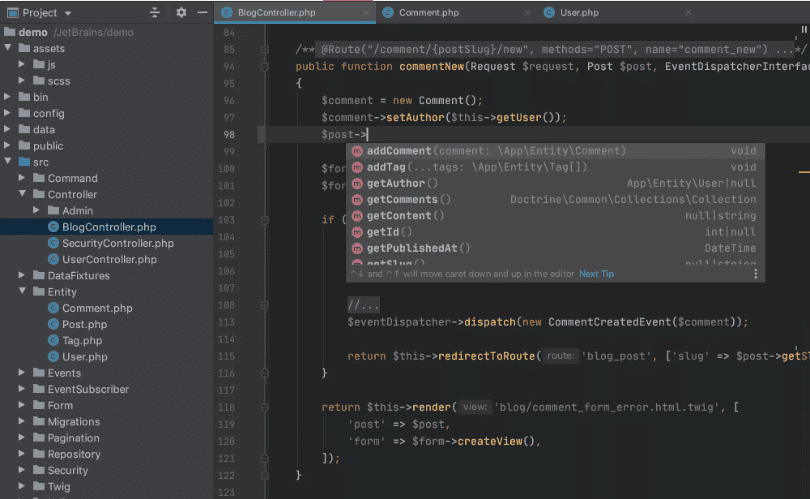
Finally, Dror and Swas have a few pointers to guide your employment journey as a WordPress developer.
A Last Word on Getting Hired
“For me, it’s not always necessarily about experience, but rather what someone’s potential is,” Dror says. For a junior developer, this is actually an advantage.
If I’m interviewing a WordPress developer with more than ten years’ experience and something seems off, that’s going to raise concerns about their capabilities. However, if a junior WordPress developer has some indicator of potential — as in, knowing something I don’t expect them to or having done more than expected for someone in their position — it’s going to set them apart.
Swas sees involvement in a hands-on project as a good sign, especially if a candidate has just completed their studies. It shows they are applying what they’ve learned; it also gives him the chance to open any source code they’re working on and ask questions based on that.
Finally, he emphasizes that you should understand what you’re getting into when applying for a junior or even internship position.
I’ve recruited junior WordPress developers and interns for my own projects and for companies. If I’m taking them on, it means that I will have to train them for between six months to a year. Learning on the job is going to take a lot out of them, and many won’t survive the process for another year or two after that.
On that sobering note — is landing a WordPress developer job a feasible prospect in the ecosystem’s current climate?
Average = Not Acceptable
Getting hired as a WordPress developer isn’t easy. The space has matured, and businesses are spoiled for choice when seeking potential candidates. It’s a dev-eat-dev, survival-of-the-cream-of-the-crop world out there. And yet, there’s never been a more exciting time to get a foot in the industry door.
I mentioned that AI and Gutenberg are rendering WP coding drudge work redundant. Our space is getting shaken up: Skilled and talented devs are needed to drive WordPress into a new era.
There’s no clear-cut path to getting a job as a WordPress developer. But if you follow the advice and pointers in this article, you’re one step closer to a coding career in our kick-ass ecosystem.
*If you’ve read this far, I assume I haven’t scared you off 😉 How’d you feel about being colleagues in code? Have a look at Freemius’s current WordPress software developer job openings:
Create “thumb-stopping” content across all our social channels. Design channel-specific strategies that make our B2B brand stand out. Build and manage our social media activities across all platforms. Turn data insights into high-performing content. Tell compelling stories that showcase our impact.
Shape and evolve our brand language, creating visual stories that resonate with software makers worldwide. Take creative ownership of our most strategic brand initiatives, from initial concept to polished execution.
This role is essential for helping us meet our content goals and deliver value to our global community. Together, we’ll create videos that educate, entertain, and empower software makers to thrive.
We are looking for a skilled web developer to take ownership of the entire technical operation of our WordPress-powered website, blog, and knowledge base. You will be working alongside a team of other developers, marketers, and product people.
Build the core experience and UI of Freemius’ products, services and dashboards for superior user experience.









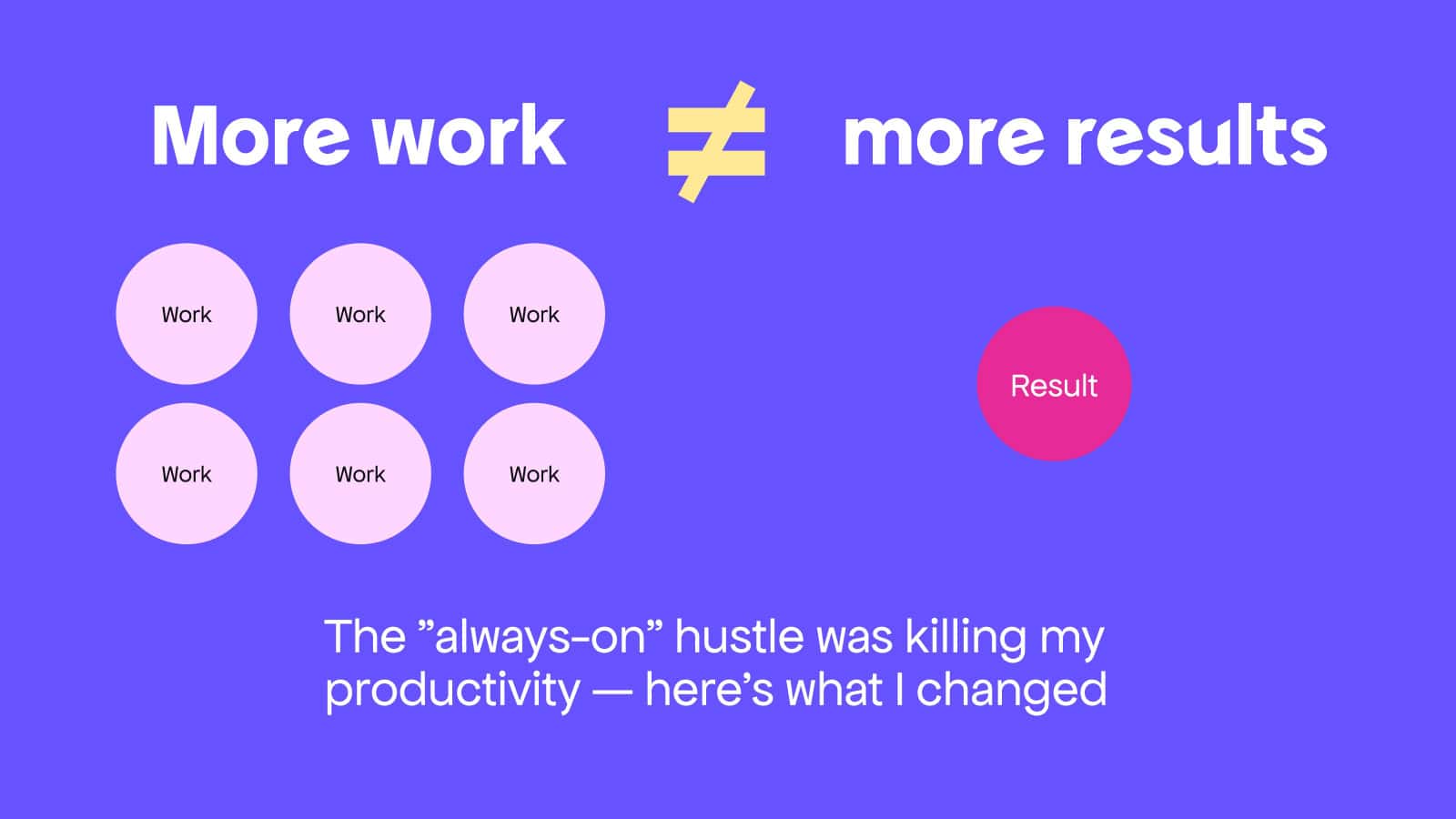
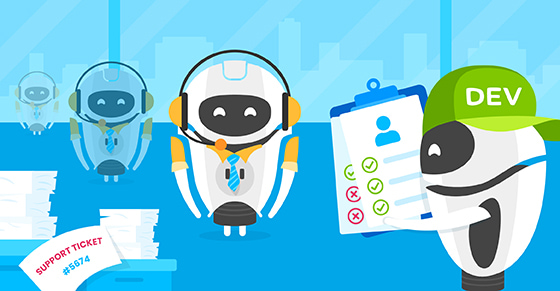

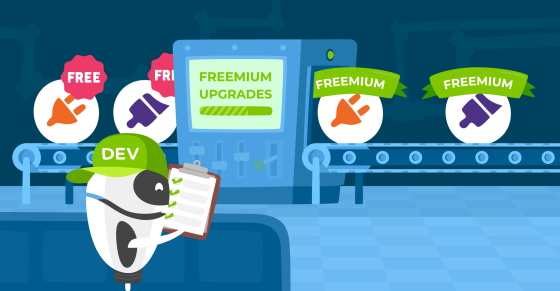
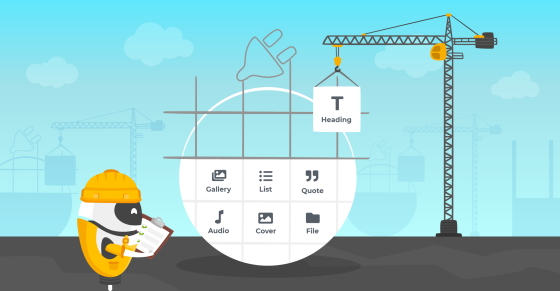
Hello! It seems that AI technologies like ChatGPT and others can also impact the remote jobs including WordPress developer, web designer, SEO's etc. Companies are already asking if the employee can handle ChatGPT prompts.
I believe in remote jobs. But things are about to change. Thanks for sharing valuable tips!